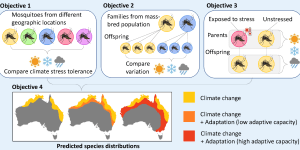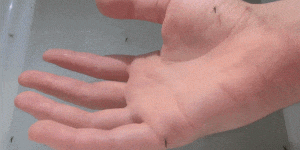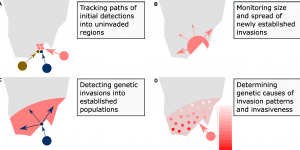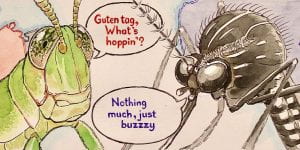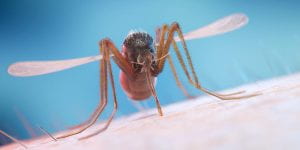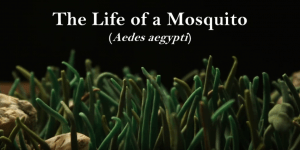Tag: mosquitoes
-
New DECRA projects coming soon! 1/2
Predicting the future threat of mosquitoes under climate change – Perran Stott-Ross Mosquitoes are major global pests, transmitting harmful pathogens to humans and livestock and causing significant nuisance biting. Climate change will lead to unprecedented temperature increases in Australia, shifting the habitats that are suitable for mosquitoes. Insects are capable of rapid evolution, but we […]blogs.unimelb.edu.au/pearg/2022/09/27/new-decra-projects-coming-soon-1-2
-
Dengue-blocking mosquitoes here to stay
This article was first published on Pursuit. Read the original article. Dr Perran Stott-Ross Story Producer: Nerissa Hannink Dengue fever and other mosquito-borne diseases remain a massive threat to human health and wellbeing. Urbanisation and climate change are likely to increase this threat as established mosquitoes spread to new environments and gain a foothold. Eradicating […]blogs.unimelb.edu.au/pearg/2022/04/12/dengue-blocking-mosquitoes-here-to-stay
-
Male mosquitoes don’t want your blood, but they still find you very attractive
Original article published in The Conversation The Conversation Perran Ross, The University of Melbourne The whine of the mosquito is unpleasant and often inescapable outdoors on summer evenings. Mosquitoes track you down from tens of metres away by sensing carbon dioxide in the air you breathe out. Within seconds, they home in on exposed skin […] -
Improving mosquito control strategies with population genomics
Words: Tom Schmidt When researchers want to investigate evolutionary processes like adaptation and dispersal, they frequently make use of population genomic methods. Population genomics uses DNA data from across an organism’s entire genome – that is, across all of that organism’s DNA. This DNA data can be compared with DNA from other organisms, which can […]blogs.unimelb.edu.au/pearg/2021/06/28/improving-mosquito-control-strategies-with-population-genomics
-
The resistance advantage – a field genetic background is important for survival of our Wolbachia mosquitoes in Malaysia and reduction of dengue
Banner image: Nancy with scientists from the Wolbachia dengue program at the Institute for Medical Research, Ministry of Health, Kuala Lumpur, Malaysia. Words and photos: Nancy M. Endersby-Harshman Our paper published two weeks ago in Insects is the result of a research collaboration between PEARG at the University of Melbourne, the Institute for Medical Research […] -
Tracking the movement of mosquito stowaways
This article was first published on Pursuit. Read the original article Dr Tom Schmidt Everyone knows mosquitoes can fly. Not everyone knows they fly in pressurised cabins 10,000 metres above the ocean. In fact, many of the most dangerous mosquito species get flown all over the world in aeroplanes, or travel on boats or other […]blogs.unimelb.edu.au/pearg/2020/08/05/tracking-the-movement-of-mosquito-stowaways
-
The life of a mosquito – claymation by Perran Ross
blogs.unimelb.edu.au/pearg/2020/05/12/the-life-of-a-mosquito-claymation-by-perran-ross
-
Dengue-blocking bacteria endure the heat
“This article was first published on Pursuit. Read the original article.” Dr Perran Stott-Ross and Professor Ary Hoffmann Bushfires. Coral bleaching. Heatwaves. These disastrous events are a harsh reality in Australia. And they’re only going to become more frequent and severe with climate change. Last year, 2019, was Australia’s hottest year ever recorded, and records […]blogs.unimelb.edu.au/pearg/2020/01/24/dengue-blocking-bacteria-endure-the-heat
-
Wolbachia infections in Aedes aegypti: The ‘Bigfoot’ of endosymbionts
Words: Perran Ross Wolbachia are endosymbiotic bacteria found within the cells of many insects, from butterflies and bees to cockroaches and dung beetles. Wolbachia are so common because they often provide their insect hosts with an advantage, aiding their spread through populations. Whether an insect carries Wolbachia is an important question, especially if they’re a […]
Number of posts found: 38
